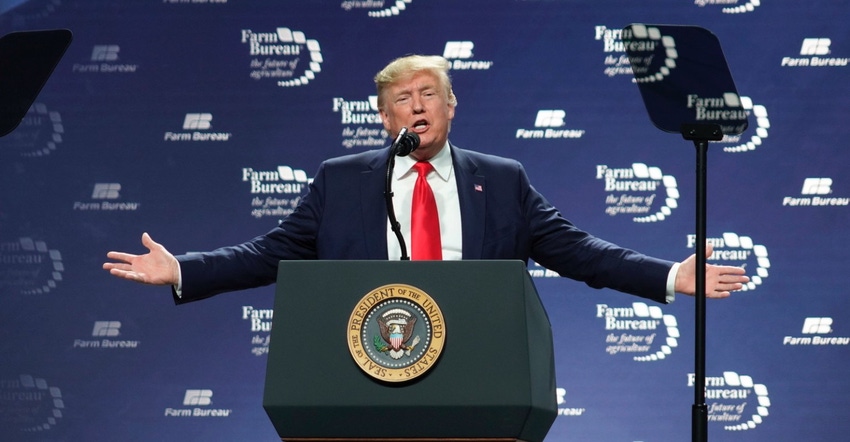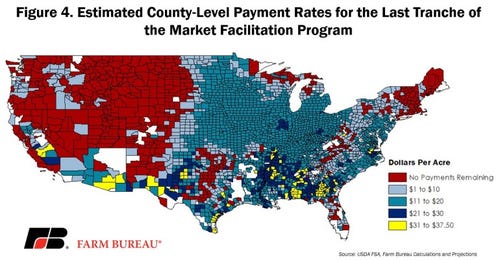
The third installment of the Market Facilitation Program 2.0 will be issued in short order, according to comments made by President Donald Trump and Secretary of Agriculture Sonny Perdue while speaking at the American Farm Bureau Federation meeting Jan. 19 and 20 in Austin, Texas. However, due to the market rebound expected from the recently signed trade agreement with China, MFP 3.0 in 2020 is unlikely.
“I am delighted to report that the final installment of all of those billions of dollars of that money will be coming very quickly,” Trump said to the thousands of famers gathered to hear him speak for the third consecutive year at the farm bureau’s annual meeting.
Trump said for years, “China stole trade secrets from American agri-businesses, and plundered our intellectual property, illicitly subsidized grain procedures, and installed one barrier after another to block out our farmers and to block out our ranchers.
“To defend our farmers, I authorized $28 billion dollars,” Trump said, adding that he asked Perdue the level of lost exports from China and explained the $16 billion in 2019 and $12 billion in 2018 was meant to make up for those lost sales. Trump also added there’s a formula on how to offer the aid and it’s not just for big farmers, but for everybody.
“Then I gave you a lot of the money, out of the tariffs. We had a lot of money left over, but we gave you — Sonny told you — $16 billion, and $12 billion the year before. And that made you do very well,” Trump said in his speech.
While speaking during a press conference the following day, Perdue shared the third tranche of MFP payments are “imminent” and he hopes it is sooner rather than later but was unable to give a definitive date.
The second round of MFP, as of Jan. 6, 2020, has provided nearly $11 billion in support. The top states receiving support from the second round of MFP payments include Iowa at $1.2 billion, Illinois at $1.1 billion and Texas at $812 million.
For livestock and specialty crops, this final tranche represents 25% of the MFP payments. For non-specialty crops and based on the county-level payment rates and the method by which the first two tranche payments were made, it’s estimated that $3 to $3.5 billion in support remains available.
John Newton, chief economist at AFBF, said in a recent market report that the county-level payment rates would range from 75 cents per acre to $37.50 per acre, with some counties already exhausting their MFP eligibility through the first two tranche payments, i.e., any counties with an original MFP payment rate of $20 or less. “If the payments were made, a majority of the tranche 3 payments would be distributed to farmers along the Mississippi and across the Corn and Cotton belts.”

Newton added the final round of MFP payments would address some farmers’ and ranchers’ financial uncertainty and would provide some assurance to many farmers and their lenders in advance of spring planting.
Perdue added that the payments are designed to replace trade lost due to the trade retaliations. “We’re hoping and expecting that trade to develop soon enough that a Market Facilitation Program will not be needed” in 2020. It is expected that trade won’t start right away under the $40 to $50 billion agreement with China, but Perdue added it is expected to build or crescendo with relief hopefully coming this summer or fall in increased agricultural purchases by China.
Perdue was confident China would abide by its agreement to purchase the $40 to $50 billion in agricultural purchases, and said he expects they’ll have to buy earlier than the traditional export season across all sectors. He said the U.S. Department of Agriculture will be providing facts on purchases to the U.S. Trade Representative’s office in order to enforce that agreement on ag purchases. The agreement is enforceable and if China fails to purchase the total of $80 billion at the end of 2021, the United States can unilaterally reinstall punitive tariffs that cannot be retaliated against.
About the Author(s)
You May Also Like






